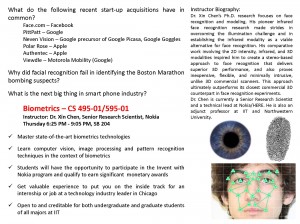 In our security conscious society, biometrics-based authentication and identification have become a central focus for many important applications as biometrics can provide accurate and reliable identification. Biometrics research and technology continue to mature rapidly, driven by pressing industrial and government needs and supported by industrial and government funding.
In our security conscious society, biometrics-based authentication and identification have become a central focus for many important applications as biometrics can provide accurate and reliable identification. Biometrics research and technology continue to mature rapidly, driven by pressing industrial and government needs and supported by industrial and government funding.
The new course Biometrics offers an introduction to major biometric techniques, the underlying pattern recognition and computer vision basis for these biometrics, scientific testing and evaluation methodologies of biometrics systems, a deeper study of facial recognition, and an examination of the current privacy and social/ethical issues surrounding this technology. The course includes readings from the literature, short writing assignments and practical experience with current biometric technology.
As a result of completing this course, students should:
- Have mastered the fundamental concepts and terminology related to biometric recognition of identity
- Understand the flow of processing in face recognition
- Be familiar with a selection of current research issues in biometrics
- Be aware of the social impact of biometric technology
- Understand the underlying technologies including computer vision, pattern recognition and 2-D/3-D image processing
CS 495-01/595-01 Biometrics will be offered on Thursdays from 6:25-9:05 pm in SB 204 and is open to both undergraduate and graduate students of all majors.
About the instructor, Xin Chen:
Xin Chen’s research focuses on face recognition and modeling. His pioneer infrared face-recognition research made strides in overcoming the illumination challenge and establishing the infrared modality as a viable alternative for face recognition. His comparative work involving the 2-D intensity, infrared and 3-D modalities inspired him to create a stereo-based approach to face recognition that delivers superior 3-D performance, and also proves to be inexpensive, flexible and minimally intrusive, unlike 3-D commercial scanners. This approach ultimately outperforms its closest commercial 3-D counterpart in face-recognition experiments.
Chen is currently a senior research scientist and a technical lead at Nokia/HERE. He is also an adjunct professor at IIT and Northwestern University.
Questions? Contact Xin Chen at xchen80@iit.edu.
